Psyllium husk is a healthy source of soluble fiber with a wide range of uses.
As a supplement, it is known for its potential to improve gut health and promote weight loss; In clinical settings, it is typically used to treat constipation; and in keto kitchens, its gluten-mimicking properties allow us to make low-carb baked goods with the right texture and flavor.
In this guide, we will explore these uses and other topics concerning psyllium husk including:
- What is psyllium husk?
- The difference between the various forms of psyllium
- Benefits of psyllium husk
- Its culinary uses
- Psyllium husk keto recipes
- Potential side effects
- Substitutions for psyllium husk powder
- Where and what to buy
- Key takeaways
What is Psyllium Husk?
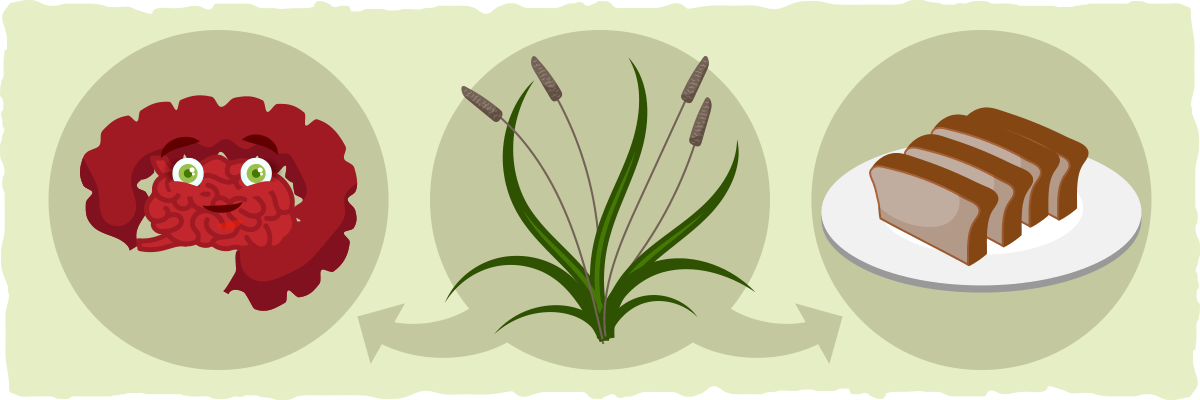
The technical definition of Psyllium husk is the outer covering of the seeds (known as the seed husk) from the Plantago ovata plant (and occasionally other members of the genus Plantago).
Psyllium husk may also be referred to as psyllium fiber, ispaghula, and white or blonde psyllium. Many brand name fiber supplements, such as Metamucil, Fiberall, and Perdiem Fiber, use psyllium husk as their active ingredient as well.
It is primarily used to help relieve constipation and mild diarrhea. The many properties responsible for psyllium’s effectiveness for these digestive issues transfer to the kitchen as well.
In fact, psyllium husk powder has become a staple ingredient for many gluten-free, low-carb, and keto recipes because of its ability to thicken liquids, replace gluten’s binding properties, and mimic the texture of whole-wheat baked goods.
However, before we take a closer look at this health-enhancing ingredient and its various uses, we must make a few distinctions.
Is Psyllium Husk Powder Keto? High in Carbs AND Keto-friendly
From a macronutrient perspective, psyllium husk powder is primarily composed of carbohydrates. However, most of these carbs come in the form of dietary fiber, which provides us with a host of health benefits and does not impair ketosis.
To help illustrate what I mean, here is a nutritional breakdown of one level tablespoon (~9 grams) of psyllium husk powder:
| Calories: | 30 |
| Fat: | 0 |
| Carbohydrates: | 8 grams |
| Dietary Fiber: | 7 grams (includes 6 g of soluble fiber and 1 g of insoluble fiber) |
| Net Carbs: | 1 gram |
| Protein | 0 |
This is part of the reason why psyllium husk powder is often used as a fiber supplement and recipe ingredient on the keto diet.
That being said, not all psyllium-based products are made in the same way. Before we use this popular keto staple, it is crucial that we know how to find the right one.
Whole Psyllium Husk, Psyllium Husk Powder, and Psyllium Seed Powder — What’s the Difference?
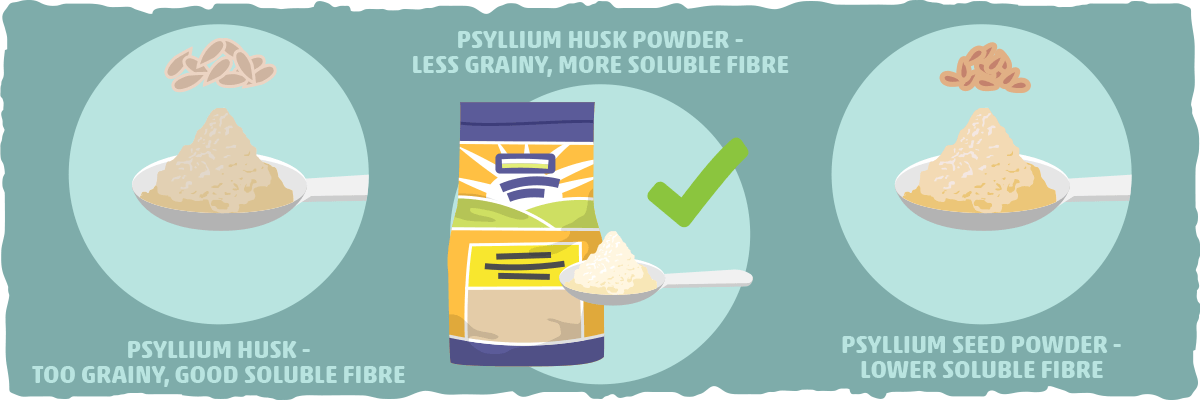
Psyllium is typically processed into one of three forms: whole psyllium husk, psyllium husk powder, and psyllium seed powder. Although each supplement is derived from the same raw seeds, they will contain different amounts of soluble fiber which will change the product’s properties.
Supplements labeled as “100% whole psyllium husk,” for example, will consist of only plantago ovata seed husks without any further processing. The husks are small, grain-like particles that are packed with roughly 70% soluble fiber.
When the whole husks are used in recipes, however, they will add a grainy texture that can be unpleasant. This is when psyllium husk powder can be helpful.
By grinding the whole husks into a fine powder, we can reduce its graininess and pack twice the soluble fiber (and possibly more health benefits) into each serving.
Because of its enhanced fiber content and superior texture, psyllium husk powder (which is also known as whole psyllium husk powder) is the most widely used psyllium product, as a dietary supplement and as a gluten-free, keto-friendly culinary staple.
This is not to be confused with psyllium seed powder, which consists of the husk and seed ground together. This form of psyllium has a lower soluble fiber content and will not provide the same health benefits or properties as psyllium husk powder.
In general, 100% psyllium husk powder is the most often used form of psyllium. It is the active ingredient in many brand-name fiber supplements like Metamucil, has been studied extensively, and plays a crucial role in making the perfect keto baked good (including cookies and bread). Other psyllium products are best avoided unless they are explicitly called for in a recipe or prescribed by your healthcare provider.
The Benefits of Psyllium Husk: From Weight Loss to Heart Disease Prevention
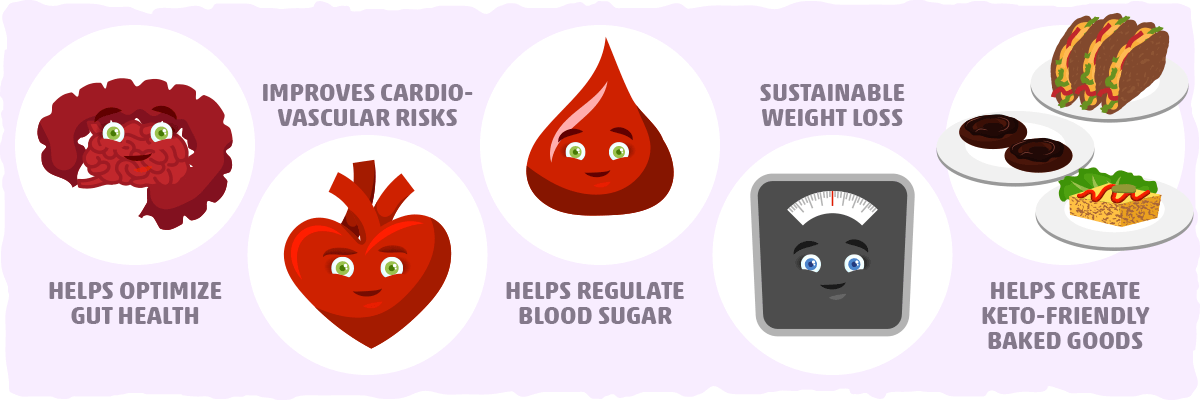
An abundance of research indicates that psyllium husk can provide several potential benefits:
1. It Can Help Optimize Gut Health for Various Digestive Issues.
When combined with liquid in the intestinal tract, psyllium husk swells and produces more bulk. This stimulates the intestines to contract and helps speed the passage of well-formed stool.
These properties promote both bowel movement frequency and size, making it an effective treatment for diarrhea and constipation.
Clinical studies have also found it to aid in the treatment of irritable bowel syndrome, ulcerative colitis, and Crohn’s disease. In fact, treatment with psyllium for four months was found to help reduce digestive symptoms by 69% in patients with ulcerative colitis. When taken together, psyllium husk and probiotics were discovered to be highly effective for reducing the symptoms of ulcerative colitis and Crohn’s disease.
2. Psyllium Husk Improves Crucial Cardiovascular Disease Risk Factors.
Increasing soluble fiber consumption, in general, has been found to be a heart-healthy choice. The soluble fibers found in psyllium fiber have been shown to be particularly beneficial.
In fact, the US Food and Drug Administration has even authorized a health claim that soluble fibers from psyllium husk, beta glucan in oats, and beta-glucan in barley can reduce the risk of heart disease. This mostly due to the fact that these soluble fibers have been consistently shown to lower blood total- and LDL-cholesterol levels.
Clinical studies on psyllium husk supplementation have also discovered significant benefits for specific conditions:
- Reduced blood total- and LDL-cholesterol levels in those with high cholesterol levels.
- Increased HDL levels in patients with type 2 diabetes.
- Decreased LDL levels for healthy subjects.
- Substantially decreased blood triglyceride levels in patients with type 2 diabetes.
- Significantly improved blood pressure levels in hypertensive, overweight, and obese patients.
Altogether, these results indicate that psyllium husk can help reduce the likelihood of heart disease from multiple angles in a significant portion of the population.
3. It Can Help Regulate Blood Sugar Levels and Aide in Type 2 Diabetes Treatment.
Fiber supplementation has been shown to reduce insulin and blood sugar levels after meals. Psyllium husk fiber is particularly effective at this because it gells and swells in the digestive tract, slowing the digestion of food.
A meta-analysis of 35 randomized and controlled clinical studies found that psyllium husk taken before meals was highly effective for type 2 diabetics. More specifically, they showed significant improvement in both fasting blood glucose concentration and glycated hemoglobin (HbA1c) after multi-week supplementation.
Subjects with pre-diabetes also experienced an improvement, albeit modest. No significant glucose-lowering effect was observed in subjects without blood sugar related issues.
Although there is no research on the impact of carb restriction and psyllium husk on type 2 diabetes, it is likely that the combination will only enhance the effect that each one already has on improving blood sugar regulation.
4. Psyllium Husk Can Make Weight Loss Easier to Achieve and Sustain.
Not only can its gelling properties help manage type 2 diabetes, but psyllium can help control appetite and boost weight loss results as well.
Studies on healthy subjects found psyllium husk supplementation to decrease hunger and desire to eat, as well as increase their feeling of fullness relative to placebo. This effect may help us feel satiated from fewer calories, eat less food throughout the day, and lose weight without fighting against hunger.
Some research indicates that psyllium’s appetite-reducing properties can contribute to a decrease in BMI, an increase in fat loss, and a reduction in calorie intake throughout the day. However, other studies have found no significant impact on weight loss.
These contradictory results reflect the complex nature of changing body composition and how important it is to find what works for each individual.
Also worth noting is that the combination of low-carb foods (which are already highly satiating) and psyllium husk supplementation has yet to be tested. It is likely that adding psyllium husk to your low carb or keto diet will only boost its weight loss potential.
5. It Plays a Crucial Role in Creating Delicious Gluten-free, Keto-friendly Baked Goods.
The allure of bread, pizza, bagels, breadsticks, and other baked goods can become irresistible when you cut them out of your diet. At a certain point, willpower just can’t compete with the desire to gorge on these goodies.
Fortunately, psyllium husk can be used to help you recreate keto-friendly, gluten-free versions of these and other high-carb favorites because of its unique properties. In fact, it is one of the most versatile ingredients you’ll come across on keto.
The Many Uses of Psyllium Husk Powder
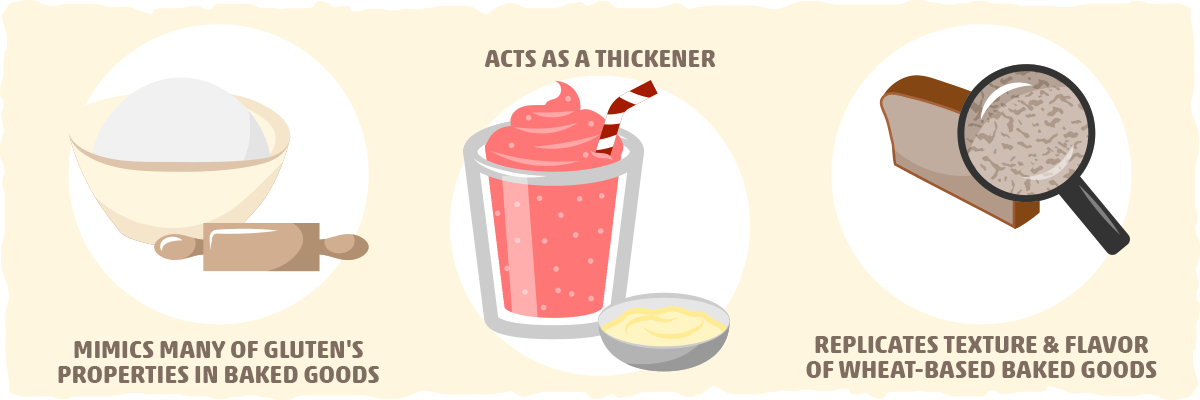
Other than being used as a dietary supplement, psyllium husk is an essential ingredient in many gluten-free, keto, and low-carb recipes as well. Here are some of the most common uses of psyllium husk powder:
- Mimics many of gluten’s properties in baked goods — psyllium husk powder enables keto-friendly bread to hold more moisture and achieve a light, airy consistency. It also helps make dough easier to handle, shape, and roll out. Altogether, these properties are what make psyllium husk powder one of the best alternatives for gluten.
- Acts as a thickener — You can also add some of the powder to smoothies, shakes, and sauces to give it a thicker consistency or incorporate a small amount into your dough if it is too runny.
- Replicates the texture and flavor of wheat-based baked goods — When used in gluten-free bread, tortillas, pizza, donuts, pie crust, and other baked goods, psyllium husk powder replicates the texture and flavor of the conventional carb-ridden varieties without adding any net carbs.
Below you will find some practical examples of how we use psyllium husk powder in our keto recipes.
Practical Examples: Psyllium Husk Powder in Keto Bread, Keto Cookies, and More
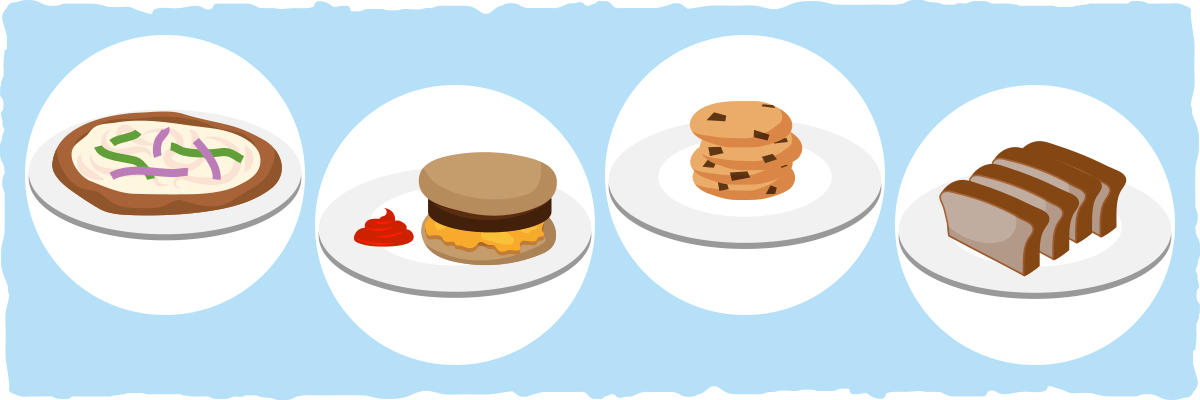
Here are some of the most popular keto recipes that rely on psyllium husk powder. Click on the photo or the button below to learn how to make it yourself:
Sometimes the burger without the bun just isn’t satisfying enough. Fortunately, with the help of psyllium husk powder and a microwave, you can have a quick keto-friendly bun. This recipe will show you the power of the husk’s binding abilities, giving the other ingredients no choice but to rise.
Sometimes the burger without the bun just isn’t satisfying enough. Fortunately, with the help of psyllium husk powder and a microwave, you can have a quick keto-friendly bun. This recipe will show you the power of the husk’s binding abilities, giving the other ingredients no choice but to rise.
These incredibly satisfying low-carb cookies mix whey protein, psyllium husk powder, almond flour, and coconut flour together to provide you with a chocolatey, chewy treat. In this recipe, our feature ingredient plays a crucial role in adding a crumb-like texture and gooeyness to each bite.
Although we call it “flax bread,” this loaf wouldn’t be as good as it is without the help of psyllium husk powder. It helps hold the ingredients together and creates the hearty consistency of whole-grain bread. This is one of the most satisfying ways to add more fat and fiber to your keto diet.
You don’t have to give up your favorite pasta dishes on keto, especially if you use some psyllium. With this keto lasagna recipe, you’ll learn how to make low-carb noodle layers using just four ingredients.
Not a fan of lasagna? Try cutting the pasta into different shapes to make keto-friendly fettuccine or low-carb egg noodles instead.
The Potential Side Effects of Psyllium Husk
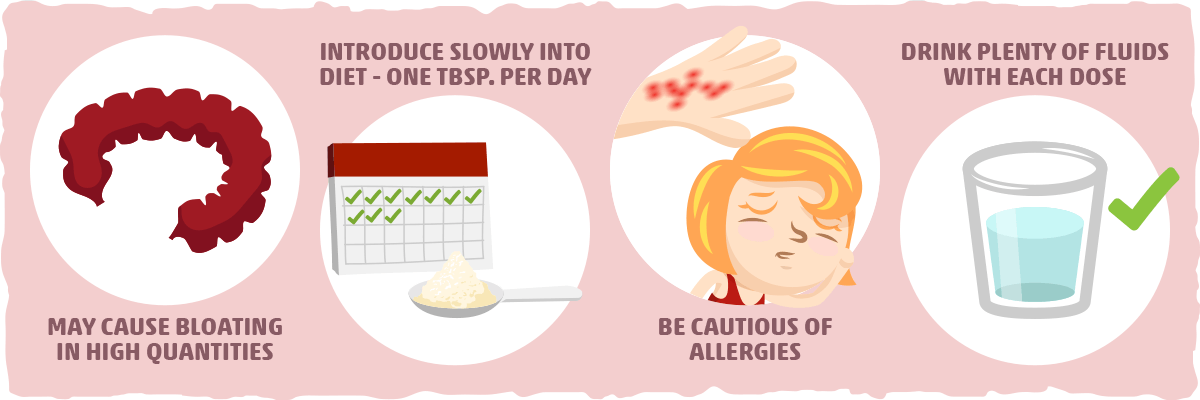
When used in recipes, psyllium husk and psyllium husk powder are completely safe and typically do not cause any side effects. However, bloating and gassiness can occur if consumed in high quantities (greater than 15 grams per day) or without adequate water intake.
A good rule of thumb is to introduce a small amount (roughly one teaspoon per day) of psyllium husk into your diet initially and gradually increase it. This will give your digestive tract a chance to adjust to the increase in soluble fiber and minimize the risk of short-term side effects.
Although rare, some people can have allergic reactions to the trace amounts of protein found in psyllium products. Inhaling the psyllium powder can also trigger allergic reactions. Unusual symptoms such as difficulty breathing or swallowing, itchiness, or stomach pain may indicate that you are allergic to the product.
Additionally, if you decide to supplement with psyllium husk powder, it is crucial that you drink plenty of fluids with each dose. Taking psyllium with insufficient fluids or in large doses can cause blockages in your esophagus or intestines.
Psyllium Husk Substitutes
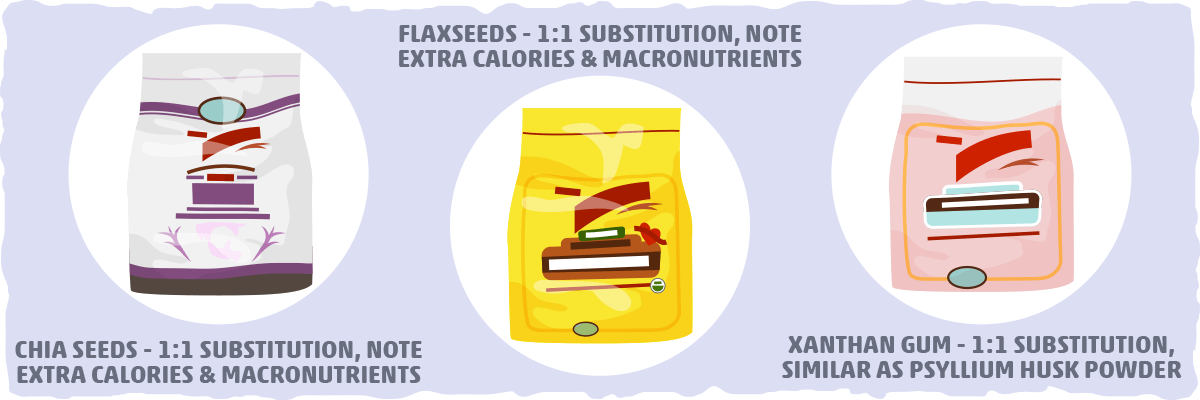
If you don’t have any psyllium husk powder or don’t like using it, try replacing it with:
- Chia seeds or flaxseeds. Use a 1:1 substitution ratio for both seeds. For example, when a recipe calls for 1/3 cup of psyllium husk fiber powder, use a 1/3 cup of ground chia seeds or ground flaxseeds. Make sure you take into account the extra calories and macronutrients from the seeds you use if you are tracking your macros.
- Xanthan gum. For those who are not fond of the taste or texture of the previous option, xanthan gum is a great alternative. You can use a 1:1 ratio to replace psyllium husk powder with xanthan gum as well.
When using these replacements, keep in mind that they may not add precisely the right texture or qualities to some recipes that you might expect. You may need to experiment with different substitutions and/or different amounts until you get it right.
Purchasing Tips: Where, What, and How to Buy Psyllium Husk
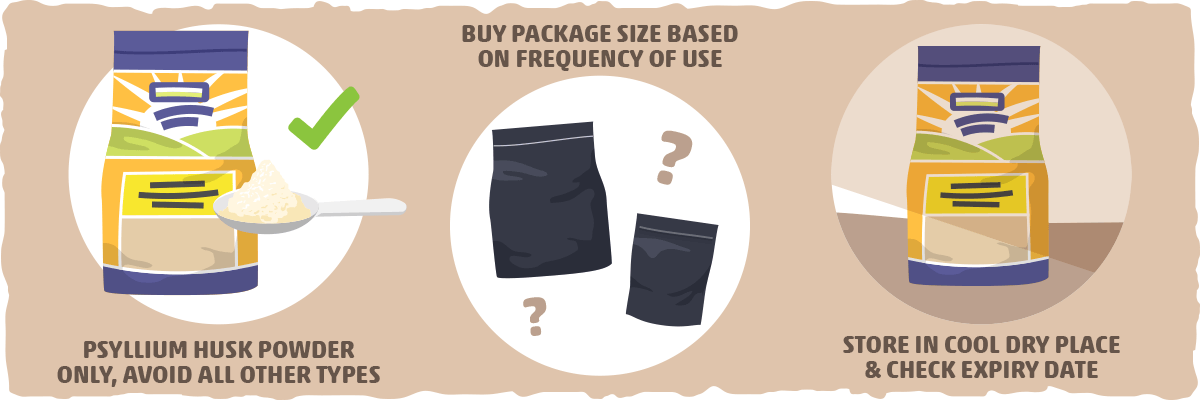
When purchasing the right psyllium husk product for your needs, make sure to keep these factors in mind:
- The type of psyllium required. Make sure you use the form of psyllium husk specified in the recipe. For instance, most of our recipes (and other keto recipes) will call for psyllium husk powder rather than whole psyllium husk. If you have whole psyllium husk, but a recipe calls for psyllium husk powder, you can simply grind the husk in a coffee grinder before measuring it out. For culinary use, all other psyllium products – including psyllium seed powder, black psyllium husk powder, psyllium husk capsules, and Metamucil (and other brand name supplements) — should not be purchased.
- Frequency of use. The majority of keto recipes involving dough or batter — such as pizza, breadsticks, bread, cookies, and donuts — will call for psyllium husk powder. Casseroles, tortillas, and smoothies/shakes may also require the additive. If you are planning to make these types of foods regularly, then purchasing larger amounts (24 ounces or more) is likely the better option. Even if you don’t use psyllium often, buying in bulk may be the cheaper strategy since it has such a long shelf life when stored properly.
- Storage and shelf life. Psyllium husk powder can last for up to 3 years (sometimes longer). To preserve the product for as long as possible, keep it in the container that it comes in and store it in a cool, dry place. Make sure the container or bag is sealed securely as it may suck up humidity from the air. After following these simple suggestions, my leftover psyllium husk powder has lasted for almost four years without losing its properties or spoiling.
With these variables in mind, you’ll be able to find the right psyllium for you amidst the plethora of products. Now, here are some tips for where you can find it:
- Grocery stores — Psyllium husk can be found in many of the larger grocery stores. It is usually found in the baking aisle or gluten-free/health food section. You may also find it in the same section as supplements or nuts and seeds.
- Natural food markets — If you can’t find it at your local grocery store, check a natural food market. Although the location will vary depending on the store, psyllium husk products will typically be found in the baking, supplement, or nut/seed aisle.
- General big-box stores — Your local Walmart, Target, or Kmart might also carry psyllium products. If they do, It is likely to be found in the baking aisle, supplement section, nut/seeds section, or gluten-free/natural food aisle. I recommend calling ahead to make sure they carry it because many of these stores only stock brand name psyllium fiber supplements like Metamucil.
- Pharmacies — Some pharmacies also stock psyllium husk because of its laxative effect. However, many of the products they carry will contain additional ingredients, so be mindful if you use this option. All products with anything other than psyllium husk in them should be avoided.
- Online — For many, the easiest way to get a hold of psyllium husk products is online. Look for 100% psyllium husk powder or 100% whole psyllium husk, depending on what your recipe calls for. It is best to avoid any product that comes in capsules. If you’d like to skip the process of sorting through the seemingly endless options, here is a link to the psyllium powder we prefer to use in our recipes: NOW Foods Psyllium Husk Powder.
Putting It All Together — Psyllium Husk for Keto
Psyllium husk powder is a versatile, safe, and keto-friendly supplement and culinary staple. It provides us with an abundance of benefits for our gut, heart, and waistline while adding many of the properties, flavors, and textures missing from gluten-free, keto-friendly baked goods.
Most keto recipes will call for psyllium husk powder so opting for a product with 100% powdered psyllium husk is usually the best choice. Brand name fiber supplements and any other psyllium supplements with added ingredients should be avoided.
If you’d like to start incorporating psyllium husk into your diet, try adding these delicious keto recipes to your weekly rotation:
- 5 Minute Keto Pizza
- Keto Chocolate Chunk Cookies
- Low Carb Flax Bread
- Toffee Nut Cake Donuts
- Bacon Cheeseburger Casserole
- Maple Sausage Pancake Muffins
- Lasagna with Keto Noodles
For those of you who don’t have any psyllium husk powder on hand and need a suitable substitute, you’ll find chia seeds, flaxseeds, and xanthan gum to be great options. They emulate many of psyllium husk’s properties well enough to prevent the need to change the recipe around completely.
If you’d like to learn more about these alternatives and other common keto baking ingredients, check out these articles:
- What is Xanthan Gum? Benefits, Risks, Uses, and Keto-friendly Substitutions
- What is Guar Gum? Definition, Benefits, Risks, & Uses
- Keto Flours and Their Substitutions
Sources
- Psyllium — Examine
- Psyllium: Current and Future Applications — ScienceDirect
- Psyllium seed husk, Blonde — American Botanical Council
- Antigenic and allergenic analysis of psyllium seed components — The Journal of Allergy and Clinical Immunology
- FUNCTIONAL BENEFITS OF PSYLLIUM FIBER SUPPLEMENTATION — CURRENT TOPICS IN NUTRACEUTICAL RESEARCH
- Randomized Clinical Trial ofPlantago OvataSeeds (Dietary Fiber) As Compared With Mesalamine in Maintaining Remission in Ulcerative Colitis — American Journal of Gastroenterology
- The effect of a Plantago ovata seed containing preparation on appetite variables, nutrient and energy intake. — International journal of obesity and related metabolic disorders
- Effect of Plantago ovata (psyllium) husk and seeds on sterol metabolism: studies in normal and ileostomy subjects — The American Journal of Clinical Nutrition
- The Effect of Psyllium Husk on Intestinal Microbiota in Constipated Patients and Healthy Controls. — NCBI
- Fiber Supplements Derived From Sugarcane Stem, Wheat Dextrin and Psyllium Husk Have Different In Vitro Effects on the Human Gut Microbiota. — NCBI
- Pharmacological basis for the medicinal use of psyllium husk (Ispaghula) in constipation and diarrhea. — NCBI
- The Right Fiber for the Right Disease: An Update on the Psyllium Seed Husk and the Metabolic Syndrome — Journal of Clinical Gastroenterology
- Psyllium fiber improves glycemic control proportional to loss of glycemic control: a meta-analysis of data in euglycemic subjects, patients at risk of type 2 diabetes mellitus, and patients being treated for type 2 diabetes mellitus. — NCBI
- Time- and dose-dependent effect of psyllium on serum lipids in mild-to-moderate hypercholesterolemia: a meta-analysis of controlled clinical trials. — NCBI
- Psyllium optimizes baking quality of bread. — Emerging Food R&D Report
- The effects of psyllium on lipoproteins in type II diabetic patients. — NCBI
- CFR – Code of Federal Regulations Title 21 — U.S. Food & Drug Administration
- Psyllium supplementation in adolescents improves fat distribution & lipid profile: a randomized, participant-blinded, placebo-controlled, crossover trial. — NCBI
- Psyllium decreased serum glucose and glycosylated hemoglobin significantly in diabetic outpatients. — NCBI
- Lipid- and glucose-lowering efficacy of Plantago Psyllium in type II diabetes. — NCBI
- The effects of 12-week psyllium fibre supplementation or healthy diet on blood pressure and arterial stiffness in overweight and obese individuals. — NCBI
- Dietary protein and soluble fiber reduce ambulatory blood pressure in treated hypertensives. — NCBI
- Intestinal microbiota, probiotics and prebiotics in inflammatory bowel disease. — NCBI
- High dose probiotic and prebiotic cotherapy for remission induction of active Crohn’s disease. — NCBI
- Management of Constipation in Older Adults. — NCBI
